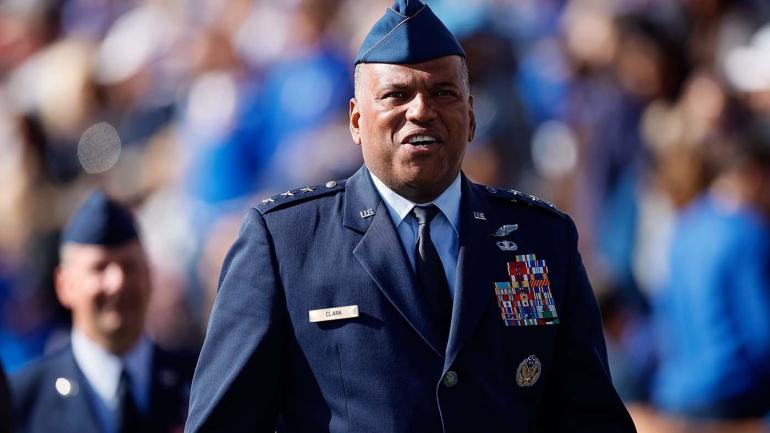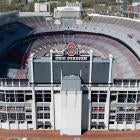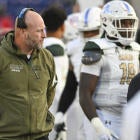
When the College Football Playoff era began in 2014, the organization hired Bill Hancock, a 40-year veteran in the college sports administrative space, as its first executive director. In June, Hancock announced that he would be retiring from the post in 2025, and the CFP has opted to go in a completely different direction with his successor.
The CFP Board of Managers hired Lt. Gen. Richard M. Clark as the second executive director of the College Football Playoff on Friday. Clark arrives to his new job after a lengthy career in the Air Force. Now, his first full-time job in college football is perhaps the most important in the sport at a pivotal moment.
Clark's Air Force credentials jump off the page. He flew more than 400 hours in combat, primarily in a B-1 Bomber, and earned the Distinguished Flying Cross among other lofty accolades. In 2020, Clark was named superintendent of the Air Force Academy, a role similar to a university president. He also played on Air Force's 1985 Bluebonnet Bowl team, which went 12-1 and finished No. 8 in the nation.
Still, Clark's experience in college athletics is far more limited. As superintendent, Clark oversaw Air Force's rise to its first College Football Playoff Rankings appearance in 2023, but the day-to-day is managed by athletic director Nathan Pine. He's also worked with the Mountain West Conference on athletic issues as superintendent.
"I've always considered myself a lifelong learner," Clark said. "Every job I've ever gone into in the Air Force over 38 years, I'm usually pretty new at whatever that mission was, and I had a lot of learning to do. But I rely on my team around me, I rely on my mentors who are supporting me and seek out the experts that can help me with some of the complex issues that surround these decisions.
"So I've been doing this kind of work generally for a long time, but not specifically with college football. I will bring those skills to bear on this and I'm excited to do it."
Clark received a phone call from the search firm within the last month. He joked that he thought one of his friends was pranking him because he was unsure whether his qualifications fit what he expected for the role. CFP leaders soon identified him as a top target, however.
The College Football Playoff Management Committee was undeterred by Clark's lack of experience in college athletics, pointing repeatedly to his leadership experience. Mississippi State president Mark Keenum serves as chair of the CFP Board of Managers, the group of presidents and chancellors that run the apparatus. During Clark's interview, Keenum only wrote that he felt Clark had the "wow factor."
"Where I'm coming from, I want someone who can be a strong advocate for the sport," Keenum said. "Yes, leadership is critical, but someone who can be an advocate, a spokesperson, be the image and the face of college football and where we go and our future. I know when General Clark walks in the room to sit and represent the College Football Playoff and college football, we're going to have a strong, effective, capable leader and a spokesperson to represent us."
Leadership and collaboration will remain front of mind as Clark will be required to oversee a complicated time in the sport. In taking over the College Football Playoff, Clark will manage some of the most powerful leaders in college sports. The 10 FBS commissioners and Notre Dame's athletic director make up the CFP Management Committee, which runs the minor details of the organization. The group has been deep in the weeds discussing the mechanics of an expanded 12-team College Football Playoff format set to debut in 2024, including discussions on whether the new field will fall from six to five automatic bids after 10 of 12 Pac-12 teams announced plans to leave the conference next year.
Clark largely stayed away from taking many stances on hot-button issues, instead saying he wished to converse and collaborate with other leaders to find the best plans. However, as a former Group of Five school leader, he did clarify that he believes it's important for there to be a spot for the G5 in the expanded playoff.
Another piece hanging over the College Football Playoff is the question of governance. Many across the sport have called for the FBS to break off from the NCAA and pointed to the CFP as a potential organization to run the sport. Clark acknowledged the expanded role in governance as a possibility.
"There's a lot of things that are going to have to happen as college football grows and where the CFP goes," Clark said. "Some of those decisions are decisions that I will be working very closely with all the stakeholders who are involved in that growth, which is one of the skills that I think I've developed over the years as a person who collaborates and really helps to pull a team together to move forward with big decisions like this."
Across the board, major college sports has taken a notable turn away from longtime administrators. The Big 12, Big Ten and Pac-12 have hired a combined four commissioners since 2020, all of whom came from outside of college athletics. The Big 12's Brett Yormark and Pac-12's George Kliavkoff both worked as entertainment executives. New Big Ten commissioner Tony Petitti has experience in baseball, broadcast and gaming. Former Big Ten commish Kevin Warren came from the NFL, and later returned as CEO of the Chicago Bears.
On a higher level, the NCAA hired former Massachusetts governor Charlie Baker as president. In his first few months on the job, Baker has spent time in Washington, D.C. testifying and lobbying Congress. Without question, Clark's experience working on Capitol Hill and with the White House was a highly attractive quality as college football enters a period of swarming legislation and lawsuits.
Hancock will stay on as full-time executive director through at least the 2024 national championship game. Clark is expected to transition into the role in 2024, and Hancock will officially retire in early 2025.
Ironically, Clark was tapped to be a member of the College Football Playoff Committee starting in 2024. He noted that, at the time, he couldn't think of a bigger honor. When the chance to become executive director arrived, there was some sadness, but this level of honor was too much to decline.
"To be a part of something as big as this for our country, it's unimaginable to me that the opportunity presented itself," Clark said. "I am honored and grateful for the chance to be a part of it. I look forward to learning more and moving forward to help us achieve those goals."





















